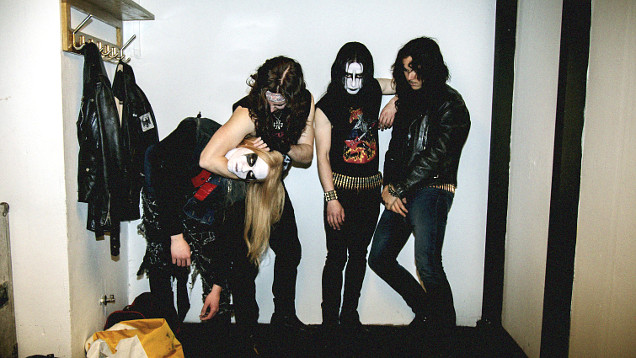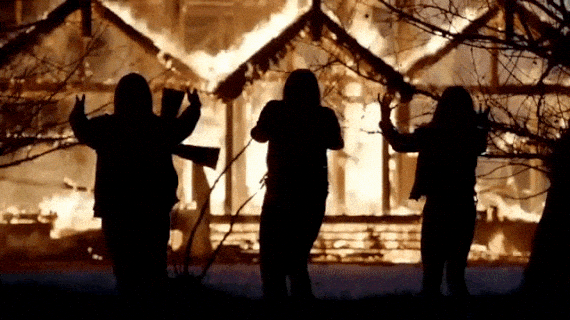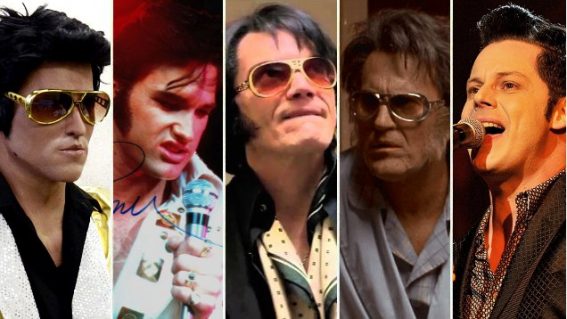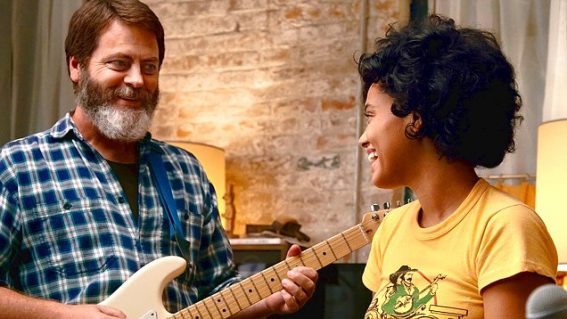Lords of Chaos revels in the brutality and banality of the early Norwegian black metal scene

Lords of Chaos is a big screen adaptation of the controversial non-fiction book of the same name, revolving around members of the black metal band Mayhem. It is about damaged outcasts doing ugly things, writes critic Travis Johnson.
Authenticity is currency in almost any given subculture, but it holds oh so much more value than usual in the metal milieu. And in the emerging black metal scene of late ‘80s/early ‘90s Norway, fidelity to the doom-laden genre’s stated nihilistic, sociopathic, allegedly pagan, and certainly nationalistic tenets led to a spate of burnt churches, a number of murders, and – to be fair – some pretty decent music.
Swedish director Jonas Åkerlund, who himself used to drum for metal outfit Bathory, knocks all this into suitable cinematic shape in Lords of Chaos, a big screen adaptation of the controversial non-fiction book of the same title by Michael Moynihan and Didrik Søderlind. At the centre of the film is ambitious guitarist Øystein “Euronymous” Aarseth (Rory Culkin), founder of the seminal black metal band, Mayhem. Euronymous looks and acts the part of a none-more-evil servant of darkness, but he talks the talk more than he walks the walk.
However, he has a knack for inspiring others and attracting committed believers to the nascent musical scene he is willing into existence. For example, there’s the death-fixated Swedish lead singer, Per “Dead” Ohlin (Jack Kilmer), who likes to huff the noxious gases of roadkill before going on stage, sleeps in a coffin, and eventually lives up to his name by committing suicide in a particularly brutal fashion.
And then there’s Varg Vikernes (Emory Cohen), newbie fan turned true acolyte, whose driving need to be taken seriously pushes him to more and more extreme acts of “realness”, inevitably leading to tragedy. “Being taken seriously” is perhaps too lofty a goal for these kids, alienated outsiders who channel their angst into increasingly theatrical and OTT demonstrations of darkness, starting with your usual teenage affectations – dyed hair, black clothes, corpse paint makeup and whatever will annoy the mundanes – before gradually growing in scope, intensity, and danger.

Despite the characters’ pretensions to Satanic evil, Åkerlund is careful to always draw us back into the banal milieu in which they live, frequently painting them as absurd in their desperation to rebel. Yet he also never lets us forget the danger that is present here, and it’s not in the faux-devil worship, the gross-out roadkill gags, the solipsistic sophistry, and all the baroque window dressing of the subculture. No, it’s the same, aimless, young, male aggression and sense of entitlement we find today. Alienated young men are easy prey for any ethos that endorses their pain. There’s a straight-line correlation between the burning of Christian churches by Varg and company to the desecration of synagogues and mosques in our time, and between the murders depicted in the film and the spree killings found in modern headlines.
On an emotional level, the film lives in the relationship between Euronymous and Varg, best frenemies coming at black metal from entirely different ambitions. For all his posturing, Euronymous is an entrepreneur, opening a record store and a music label to cash in on their genre’ growing notoriety, and trying to figure out what angles each new scandal affords him. Culkin plays him perfectly – this is someone who could have thrived in any environment, who just happened to find himself at the birth of a scene and played the cards dealt to him. At a pivotal moment Euronymous has his girlfriend (Sky Ferreria in a pretty thankless role) cut off his trademark long black hair, and you grasp that its all surface for him – just affectation.
By contrast, Varg, who is elevated from scorned try-hard to inner circle member over the course of the film, is motivated by darker ideologies, and for all that he often looks like a hopelessly gormless poseur, Cohen never lets us lose sight of his dangerous core. This is someone at breaking point, and the film wrings a lot of tension out of the audience seeing the potentially explosive violence he holds within himself, and absolutely no other characters realising that. Every jibe, every perceived slight, pushes Varg closer to the inevitable, until…
Well, it’s all on Wikipedia, in any case, but we’ll defer to spoiler sensibilities. The real strength of Lords of Chaos is that it refrains from endorsing the participants’ self-mythologising, for the most part, instead underling the fact that these were damaged outcasts doing ugly, eventually unspeakable things for nebulous reasons of their own invention. The message the film leaves the viewer with is not one of the majesty of darkness, but of the banality and pettiness of the whole sordid exercise. Let’s hope that was the intention.

















